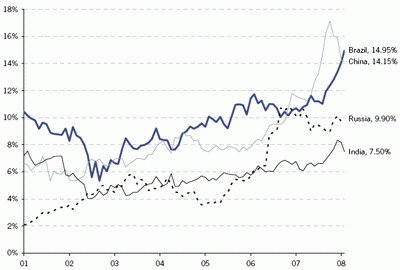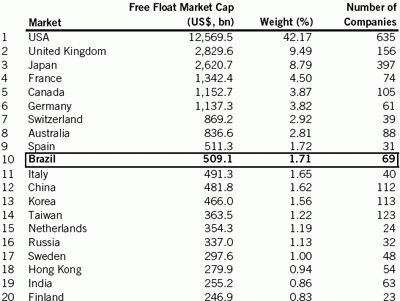Brazil raised the minimum wage by 9,2 percent to 415 Reais a month (163 EU) yesterday. Millions of salaries and pensions based on multiples of this base salary will now go up. The increase in salaries was more than twice the 2007 rate of inflation. Inflation in 2007 was 4,5%.
The good news is that at the same time, the Brazilian central bank announced that Brazil’s inflation index fell to a seven-month low in February. Brazil is probably one of the only countries where inflation is contained. The very good effect of this February inflation figure is that the central bank will not have to raise interest rates. Good news to support the GDP growth ambitions for this year. Actually, since 2006 the SELIC interest rate was lowered 14 times consecutively. The last three meetings the Brazilian Central Bank held the rates unchanged at 11,25%.
Reading the above, it won't come as a surprise that Brazil has become the world’s largest emerging market. The news was revealed last Friday, based on Figures of the Morgan Stanley Country Index. Brazilian free float stands at 509 billion US$ while China’s is at 482 billion US$. The chart below shows the country weightings in the MSCI Global Emerging Markets index. This news is absolutely impressive, given that the Chinese stock market is in a bubble phase while the Brazilian Bovespa isn’t. China’s key Shangai Composite Index is in the middle of a pullback, down 18% after rocketing 96,7% higher last year. Does this mean you should buy Brazilian stocks and hope for last year’s yields? No. Brazilian stocks are expensive and overbought. But everyone agrees that the Brazilian surge will last on a long-term basis. This is the time for entrepreneurs to get in and really work the market. The shortage will be local talent to develop the Brazilian opportunities, not the liquidity in the Brazilian markets.

Emerging South
The world upside down.
Move over China: Brazil is largest emerging market
By John Baeyens | Share This 
Tags
American protectionism ANC Andrew Feinstein Apartamento em Niteroi Argentina argentina Azul Belgian-strike belgium biodiesel bonds borderlinx BOVESPA bovespa Brazilian_economy brazilian_real_currency_rate Brazil weekly news carbon casa casa em Florianopolis Colinas do Mar COPE credit crisis deflation dollar entrepeneurs environment ethanol EU recession exchange external_debt flights florianopolis food Gafisa GDP Brazil German_productivity global recession inflation Inga innovation interest rate Brazil interest rate South Africa keatingeconomics Latin America leisuretime Mbeki movie mozambique music national credit act Oceanair oil opportunity petrobras planning prime productivity real Real recession SAR sequoia solar South Africa south africa South_African_Economy south_africa_real_estate_2009 stagflation stocks timetracking united_states US economy 2009 US recession US_economy V-shape recession venezuela oil southafrica Zuma
Recent Comments
- LuckyLuke on Linkedin discussion on BRIC countries Do you know that there is diet plan base ...
- JakeBoummaNom on Linkedin discussion on BRIC countries Hi to all. Hope i'm wellcome here. ...
- Illulavop on Linkedin discussion on BRIC countries http://imgwebsearch.com/35357/img0/casin ...
- fieftRopHoife on Linkedin discussion on BRIC countries Hi I'm going to buy a bike. Counld someo ...
- fieftRopHoife on Linkedin discussion on BRIC countries Hey I'm going to buy a bike. Counld some ...
- Domenus on Linkedin discussion on BRIC countries LetItBook.com - Books, magazines, audiob ...





